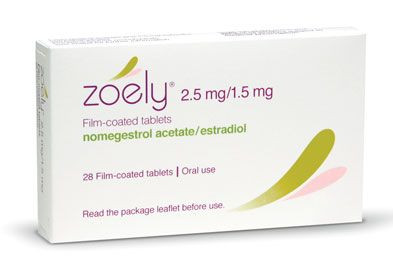Birth Control Promising Less Acne And Fewer Adverse Effects: Zoely Contraceptive Now Available In The UK

The United Kingdom made one of the latest birth control pills, Zoely, available this week. With a lower dose of hormones, it's expected to reduce the number of side effects, including acne, which came with the use of previous birth control pills.
As a combined oral contraceptive, Zoely tablets are a combination of two steroid hormones: 17-beta estradiol, an estrogen structurally similar to estrogen produced by the ovaries, and nomegestrol acetate, a steroidal progestin mimics naturally-occuring progesterone. It comes as a 24 day active and four day placebo dosing regimen.
"Zoely has a slightly different hormone mix to the combined pills we've had up to now," Dr. Rosemary Leonard, general practitioner and women's health specialist, said to Yahoo! U.K. "Like those, it has both oestrogen (estradiol) and progesterone components, but the estrogen component is much more like the natural hormone than [what] you find in current pills.... And the progesterone component has an anti-androgen that blocks testosterone, which can really help women who suffer from acne."
Yasmin had been the preferred contraceptive pill for women who experience side effects, Leonard said. But for women who do not respond well to Yasmin, Zoely could offer a solution. However, it will come at a price five times higher than the cheapest birth control pill on the British market, Microgynon.
Women who experienced more frequent acne are often directed to take the contraceptive pill Dianette. However, Dianette has been linked to an increased risk of deep vein thrombosis — a blood clot that forms in veins deep inside the body — and at least one death. Zoely could become a good alternative for certain women seeking birth control options.
"I think [Zoely] a good option for women who haven't found the right pill for them or who have problem skin," Leonard told Yahoo! U.K. "There is no perfect pill, but for these women it may be worth a try."
Birth control pills have been linked to dangerous side effects. Last month, Health Canada reported that about 600 women had developed adverse side effects after taking Yaz and Yasmin since 2007. Of these women, 15 deaths had been linked to Yasmin, and eight to Yaz. Like Dianette, the deaths also resulted from blood clots due to taking the pill.
In 2011, Health Canada warned that although the risk of blood clots while using birth control pills made by Bayer — the manufacturer of Yaz and Yasmin — was rare, it was still 1.5 to three times more likely to happen when compared to using other products. Three out of 10,000 women who took Yaz or Yasmin developed blood clots, compared to only one out of every 10,000 who took other birth control products.



























